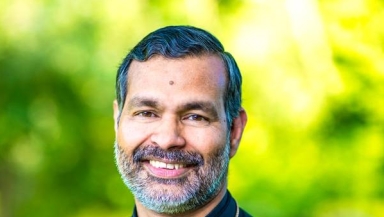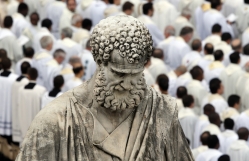
Perseverance. Persistence. Pushing through. These are all seen as great Christain virtues. Yet they're so hard to emulate. How can we do it?
In Luke 18:1 we read, "Jesus told his disciples a parable to show them that they should always pray and not give up." So the key is found somewhere in the next eight verses.... The story of the Persistent Widow, also known as the parable of the Unjust Judge, tells of how a woman repeatedly seeks justice.
In the culture of the day, women were very much second class citizens. They wouldn't have had good access to justice, even with a fair judge. A man's word would have been favoured over a woman's. In addition, this woman is a widow. She is on her own with no one to stand alongside her. No family or expensive team of lawyers out to fight her case.
Jesus is very clear about what it is that persuades the judge to do the right thing for once. It's her persistence.
It says, "For some time he refused. But finally he said to himself, 'Even though I don't fear God or care what people think, yet because this widow keeps bothering me, I will see that she gets justice, so that she won't eventually come and attack me!'" When he realises how faithful the woman is, he grants justice.
Jesus then compares him to God. And his fellow Jews knew that their God was everything that this judge wasn't. He was powerful, almighty, and supreme. So if this judge listened to the persistence of this woman, how much more likely was it that God himself would listen to their prayers?
Jesus says, "And will not God bring about justice for his chosen ones, who cry out to him day and night? Will he keep putting them off? I tell you, he will see that they get justice, and quickly."
Jesus often used characters that surprise and jolt us into a new perspective of seeing. This parable is a great example - Jesus uses a figure with no power as an example of faith and persistence. If this person can do it - don't you think you can?
Theologian Walter Wink wrote, "History belongs to the intercessors [people who pray], who believe the future into being." In this parable the hero is a woman who refuses to take "no" for an answer. She believes the future can be different. She had no power or money and could not hold the judge to account for anything that might sway him, other than persistent petitioning. She prefigures the many movements for justice who have refused to give up their quest despite violence against them.
In 1963, Sam Cooke released the song A Change is Gonna Come that proved inspirational for the Civil Rights Movement with the lyrics: "It's been a long, a long time coming, But I know a change gonna come, oh yes it will." Praying for God's Kingdom to come sometimes seems like an impossible task faced with the onslaught of forces and views that seem to be so contrary to the values of God's vision for the world. Yet we are never to stop believing and working and living and praying for it to come.

If we take this story in isolation it would be easy to think that the best way to get what we want is to keep pestering God, to keep tugging on his sleeve and then eventually we'll get our way. But that's not really how prayer works.
First, the text itself doesn't say that we'll get what we want as long as we keep praying. It actually says we will get justice. So it's not just about 'I would like a new pair of shoes or a better car or something and as long as I keep praying, then God will give me that.' It's actually about knowing that God desires us to be justly treated and through prayer we get closer to him and understand better what that justice actually looks like.
Second, we actually know from elsewhere in the Bible, and from our lives as well, that we don't always get what we think of as justice. We may pray for years for healing, or for a relationship to get better or for a wrong done to us to be made well again. But sometimes, we have to wait for years and nothing seems to change.
God knows everything that has been done to us. All the things we're afraid of and all the ways in which we've been badly treated. By coming to Him in prayer, we can ask for justice and by spending that time in His presence we learn that He has already done the most important thing. Through His death on and resurrection, He is making all things new. In this respect he's much more effective than the judge. Not only does He make a just decision, He actually sacrifices Himself to bring about justice and to reconcile us to God and to each other.
So this parable doesn't promise us what we want if we keep praying, but it does promise us justice.

CH Spurgeon said, "If you argue with the Lord... in such a style as this, you will find that this kind of pleading is potent with him who is omnipotent... When a man of means gives you his cheque, you count it just as good as hard cash; and God's promises are even better than cheques or bank notes. We have only to take them, and plead them before him, and we may rest assured that he will honour them."
In addition to the ways I've already mentioned that we pray together here at church, we also need to try and discover the discipline of praying on our own.
Tony Campolo, the Baptist minister and activist, writes about how to make this possible. He says, "There's an old African-American spiritual that begins, 'Woke up this morning with my mind stayed on Jesus.' I am gaining some idea as to what they were singing about. I think they had something in common with Ignatius--and with an age-old Christian contemplative tradition that finds perfect expression in centering prayer."
The last line of the parable sees Jesus throwing out a challenge to his disciples and to us as a Church. He simply asks, "When the Son of Man comes, will he find faith on the earth?" If, according to this story, we show our faith and deepen it by praying then we have to hope that when Jesus looks at us, he finds a group of individuals and a community that prays, that persists in prayer and that encourages one another in prayer.















